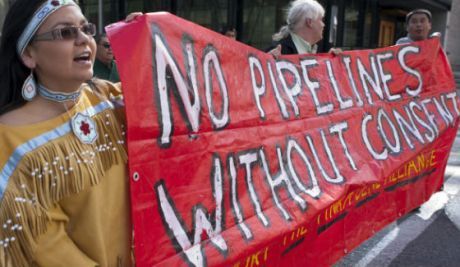News
You are here
No consent, no pipelines

March 11, 2016
There is a contradiction at the heart of the Trudeau government. It has launched the long-overdue inquiry into missing and murdered Indigenous women, but at the same time it is continuing to support tar sands expansion that is devastating Indigenous communities.
The Chippewas of the Thames First Nation are having to raise significant sums of money to challenge the National Energy Board at the Supreme Court over its approval of Enbridge using Line 9 pipeline to pump tar sands through their territories without their consent. This pipeline runs across Ontario and Quebec, including through 18 Indigenous territories. As Myeengun Henry explained, "Line 9 has been flowing crude oil through Chippewas of the Thames traditional territory for 40 years without our consent. It is time for industry and governments to honour the treaties and wampum belt agreements. Indigenous nations and all residents of Canada are responsible for the safety of our Mother Earth!"
Many other First Nations are fighting similar battles, opposing pipelines and fracking through court cases, land defense, blockades, and demonstrations.
No means no
As Indigenous activist Amanda Lickers stated when she and other activists interrupted an Energy East pipeline consultation in Montreal last September, “What we want TransCanada to understand is that no means no. This is Kanien’ke, this is Mohawk Land, and we are tired of occupation, we are tired of environmental disaster. This is our land and we are going to protect it.”
The Liberal government can’t claim that they understand the suffering inflicted on Indigenous communities because of systemic violence and racism over centuries, and at the same time support pipeline projects that run through Indigenous lands without consent, bringing the spectre of ruptured pipelines.
This contradiction speaks to the reality of the Liberal Party. It is a party of big business, whose major allegiance is to the corporate elites in Canada and whose major funders are corporations. They view the resources of this country as a source of profit. As much as they may put forward a different line in the media than the Harper government , they serve the same masters. We got a glimpse of this when Liberal campaign co-chair Daniel Gagnier was exposed for funneling tips to TransCanada about how to get in on the ground floor if the Liberals won the election.
As Trudeau said before the election, “We need to get our resources to market and more oil by rail is a bad idea. We need to do it in a responsible way and that means pipelines. But those pipelines have to achieve the public trust and the social license that is necessary.”
Part of winning that “social license” is through his pledge to overhaul the pipeline review process to include climate impacts. But as Indigenous activist Clayton Thomas-Muller said, “because any proper review process will clearly show the damage these pipelines present to our climate and communities, especially those on the frontlines of tar sands extraction,” said Thomas-Muller. “This is a real test of this government’s commitments to uphold the rights of Indigenous Peoples At the heart of the United Nations Declaration on the Rights of Indigenous Peoples is the right to free, prior and informed consent. That means Indigenous Peoples have the right to say ‘No’ when it comes to projects like pipelines and its responsibility of the government to listen.”
Trudeau can’t fulfill his promise to respect Indigenous peoples and keep global warming below 1.5 degrees Celsius while promoting tar sands pipelines and criminalizing resistance through Bill C-51.
In the face of these contradictions, a new wave of protest is growing. Indigenous communities are intervening in the inquiry to demand it be led by Indigenous women, free from government interference, and that it investigate state violence. And the Indigenous-led climate justice movement is continuing to demand respect for Indigenous sovereignty, an end to colonialism and racism, and a real climate strategy to transition away from dirty tar sands to just and sustainable green energy.
Donate to the Chippewas of the Thames First Nation legal challenge. Join the discussion “Climate justice now,” a fundraiser for the Chippewas of the Thames First Nation featuring guest speaker Myeengun Henry, on Saturday April 23, the closing plenary of the conference Ideas for Real Change
Section:










